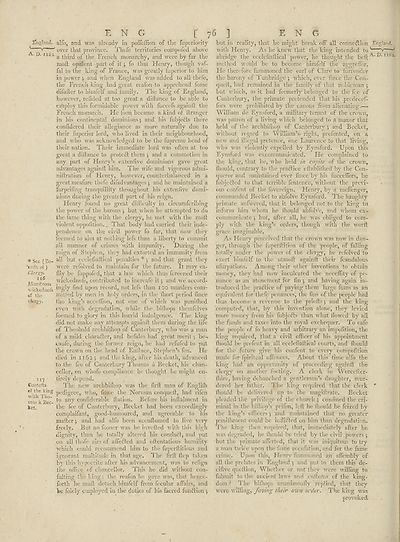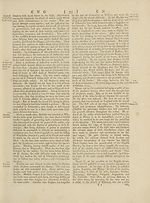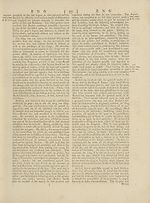Encyclopaedia Britannica, or, a Dictionary of arts, sciences, and miscellaneous literature : enlarged and improved. Illustrated with nearly six hundred engravings > Volume 8, ELE-FOR
(88) Page 76
Download files
Complete book:
Individual page:
Thumbnail gallery: Grid view | List view

E N G [ 76
l!ng!and. alfo, and was already in poffeffion of the fuperiority
^ "v—— over that province. Thefe territories compofed above
■ D. 1162. & 0£ |_Jie French monarchy, and were by far the
molt opulent part of it j fo that Henry, though vaf-
fal to the king of France, was greatly fuperior to him
in power ; and when England was added to all thefe,
the French king had great reafon to apprehend fome
difafter to himfelf and family. The king of England,
however, relidcd at too great a diftance to be able to
employ this formidable power with luccefs againft the
French monarch. He loon became a kind of Hr anger
in his continental dominions 5 and his fubjects there
conlidered their allegiance as more naturally due to
their fuperior lord, who lived in their neighbourhood,
and who was acknowledged to be the fupreme head of
their nation. Their immediate lord was often at too
great a didance to protect them ■, and a commotion in
any part of Henry’s extenlive dominions gave great
advantages again it him. The wife and vigorous adrni-
niltration of Henry, however, counterbalanced in a
great meafure thefe difadvantages 3 and he maintained a
lurpriling tranquillity throughout his extenlive domi¬
nions during the grcatelt part of his reign.
Henry found no great difficulty in circumfcribing
the power of the barons 3 but when he attempted to do
the fame thing with the clergy, he met with the moll
violent oppolition. That body had carried their inde¬
pendence on the civil power fo far, that now they
i’eemed to aim at nothing lefs than a liberty to commit
all manner of crimes with impunity. During the
reign of Stephen, they had extorted an immunity from
* See (Ee- but ecclefialtical penalties * 3 and that grant they
refit ot) were refolved to maintain for the future. It may ea-
C.lerxy. fily be luppofed, that a law which thus fereened their
t'onitn 1 wickednefs, contributed to increafe it 3 and we accord-
v. ickednet's upon record, not lefs than 100 murders com-
@f the mitted by men in holy orders, in the Ihort period lince
clergy. the king’s acceffion, not one of which was punilhed
even v/ith degradation, while the bilhops themfelves
feemed to glory in this horrid indulgence. The king
did not make any attempts againll them during the life
of Theobald archbilhop of Canterbury, who tv as a man
of a mild character, and betides had great merit 3 be-,
caufe, during the former reign, he had refufed to put
the crown on the head of Euilace, Stephen’s fon. He
died in 11623 an^ the king, after his death, advanced
to the fee of Canterbury Thomas a Eecket, his chan¬
cellor, on whofe compliance he thought he might en-
117 tirely depend.
Contefts The new archbilhoo was the firit man of Enulilh
'th"'11^ pedigree, who, lince the Norman conqueil, had rifen
rr s k lice to any conliderable ftation. Before his inllalment in
iet. the fee of Canterbury, Becket had been exceedingly
complaifant, good-humoured, and agreeable to his
mailer; and had alfo been accullomed to live very
freely. But no fooner was he invelled with this high
dignity, than he totally altered his conduct, and put
on all thofe airs of affected and oftentatious humility
which could recommend him to the fuperllitious and
ignorant multitude in that age. The frit llcp taken
by this hypocrite after his advancement, was to refign
the office of chancellor. This he did without con-
lulting the king : the reafon he gave was, that hence¬
forth he mull detach himfelf from fecular affairs, and
be folcly employed in the duties of his facred funflion 3
] ENG
but in reality, that he might break off all connection Engla
with Henry. As he knew that the king intended to v
abridge the ecclelialtical power, he thought the bell A‘ 1
method would be to become himfelf the aggreffor.
He therefore fummoned the earl of Clare to lurrendcr
the barony of Tunbridge 3 which, ever lince the Con¬
queil, had remained in the family of that nobleman 3
but which, as it had formerly belonged to the fee of
Canterbury, the primate pretended that his prcdecef-
fors were prohibited by the canons from alienating-—
William de Eynsford, a military tenant of the crown,
was patron of a living which belonged to a manor that
held of the archbilhop of Canterbury 3 and Becket,
without regard to William’s- right, prefented, on a
new and illegal pretence, one Laurence to that living,
■who rvas violently expelled by Eynsford. Upon this
Eynsford was excommunicated. He complained to
tjie king, that he, who held in ccipite of the crown,
Ihould, contrary to the practice ellabliihed by the Con¬
queror and maintained ever liuce by his fueceffors, be
fubjedled to that terrible fentence, without the previ¬
ous confent of the fovereign. Henry, by a meffenger,
commanded Becket to abfolve Eynsford. The haughty
primate anfwered, that it belonged not to the king to
inform him whom he Ihould abfolve, and whom ex¬
communicate 3 but, after all, he was obliged to com¬
ply with the king’s orders, though with the world
grace imaginable.
As Henry perceived that the crown was now in dan¬
ger, through the fuperllition of the people, of falling
totally under the power of the clergy, he refolved to
exert himfelf to the utmoft againft their feandalous
ufurpations. Among their other inventions to obtain
money, they had now inculcated the neeeffity of pe¬
nance as an atonement for fin 3 and having again in¬
troduced the praflice of paying them large fums as an
equivalent for thefe penances, the fins of the people had
thus become a revenue to the priefts 3 and the king
computed, that, by this invention alone, they levied
more money from his fubjefls than what llowcd by all
the funds and taxes into the royal exchequer. To eafe
the people of fo heavy and arbitrary an impofition, the
king required, that a civil officer of his appointment
fhould be prefent in all eeelefiallieal courts, and fhould
for the future give his confcnt to every compofition
made for fpiritual offences. About this time alfo the
king had an opportunity of proceeding againll the
clergy 071 another footing. A clerk in Worceftcr-
Ihire, having debauched a gentleman’s daughter, mur¬
dered her father. The king required that the clerk '
fhould be delivered up to the magillrate. Becket
pleaded the privilege of the church 3 confined the cri¬
minal in the biffiop’s prifon, left lie fhould be feized by
the king’s officers ; and maintained that no greater
punifhment could be inflifted on him than degradation.
The king then required, that, immediately after he
was degraded, he Ihould be tried by the civil powers 3
but the primate afferted, that it wras iniquitous to try
a rna’i twice upon the fame accufation, and for the fame
crime. Upon this, Henry fummoned an affembly of
all the prelates in England 5 and put to them this de-
cifive queftion, Whether or not they were willing to
fubmit to the ancient laws and cuftoms of the king¬
dom ? The bilhops unanimoufly replied, that they
were willing, favtng their oix'n order. The king was
provoked
l!ng!and. alfo, and was already in poffeffion of the fuperiority
^ "v—— over that province. Thefe territories compofed above
■ D. 1162. & 0£ |_Jie French monarchy, and were by far the
molt opulent part of it j fo that Henry, though vaf-
fal to the king of France, was greatly fuperior to him
in power ; and when England was added to all thefe,
the French king had great reafon to apprehend fome
difafter to himfelf and family. The king of England,
however, relidcd at too great a diftance to be able to
employ this formidable power with luccefs againft the
French monarch. He loon became a kind of Hr anger
in his continental dominions 5 and his fubjects there
conlidered their allegiance as more naturally due to
their fuperior lord, who lived in their neighbourhood,
and who was acknowledged to be the fupreme head of
their nation. Their immediate lord was often at too
great a didance to protect them ■, and a commotion in
any part of Henry’s extenlive dominions gave great
advantages again it him. The wife and vigorous adrni-
niltration of Henry, however, counterbalanced in a
great meafure thefe difadvantages 3 and he maintained a
lurpriling tranquillity throughout his extenlive domi¬
nions during the grcatelt part of his reign.
Henry found no great difficulty in circumfcribing
the power of the barons 3 but when he attempted to do
the fame thing with the clergy, he met with the moll
violent oppolition. That body had carried their inde¬
pendence on the civil power fo far, that now they
i’eemed to aim at nothing lefs than a liberty to commit
all manner of crimes with impunity. During the
reign of Stephen, they had extorted an immunity from
* See (Ee- but ecclefialtical penalties * 3 and that grant they
refit ot) were refolved to maintain for the future. It may ea-
C.lerxy. fily be luppofed, that a law which thus fereened their
t'onitn 1 wickednefs, contributed to increafe it 3 and we accord-
v. ickednet's upon record, not lefs than 100 murders com-
@f the mitted by men in holy orders, in the Ihort period lince
clergy. the king’s acceffion, not one of which was punilhed
even v/ith degradation, while the bilhops themfelves
feemed to glory in this horrid indulgence. The king
did not make any attempts againll them during the life
of Theobald archbilhop of Canterbury, who tv as a man
of a mild character, and betides had great merit 3 be-,
caufe, during the former reign, he had refufed to put
the crown on the head of Euilace, Stephen’s fon. He
died in 11623 an^ the king, after his death, advanced
to the fee of Canterbury Thomas a Eecket, his chan¬
cellor, on whofe compliance he thought he might en-
117 tirely depend.
Contefts The new archbilhoo was the firit man of Enulilh
'th"'11^ pedigree, who, lince the Norman conqueil, had rifen
rr s k lice to any conliderable ftation. Before his inllalment in
iet. the fee of Canterbury, Becket had been exceedingly
complaifant, good-humoured, and agreeable to his
mailer; and had alfo been accullomed to live very
freely. But no fooner was he invelled with this high
dignity, than he totally altered his conduct, and put
on all thofe airs of affected and oftentatious humility
which could recommend him to the fuperllitious and
ignorant multitude in that age. The frit llcp taken
by this hypocrite after his advancement, was to refign
the office of chancellor. This he did without con-
lulting the king : the reafon he gave was, that hence¬
forth he mull detach himfelf from fecular affairs, and
be folcly employed in the duties of his facred funflion 3
] ENG
but in reality, that he might break off all connection Engla
with Henry. As he knew that the king intended to v
abridge the ecclelialtical power, he thought the bell A‘ 1
method would be to become himfelf the aggreffor.
He therefore fummoned the earl of Clare to lurrendcr
the barony of Tunbridge 3 which, ever lince the Con¬
queil, had remained in the family of that nobleman 3
but which, as it had formerly belonged to the fee of
Canterbury, the primate pretended that his prcdecef-
fors were prohibited by the canons from alienating-—
William de Eynsford, a military tenant of the crown,
was patron of a living which belonged to a manor that
held of the archbilhop of Canterbury 3 and Becket,
without regard to William’s- right, prefented, on a
new and illegal pretence, one Laurence to that living,
■who rvas violently expelled by Eynsford. Upon this
Eynsford was excommunicated. He complained to
tjie king, that he, who held in ccipite of the crown,
Ihould, contrary to the practice ellabliihed by the Con¬
queror and maintained ever liuce by his fueceffors, be
fubjedled to that terrible fentence, without the previ¬
ous confent of the fovereign. Henry, by a meffenger,
commanded Becket to abfolve Eynsford. The haughty
primate anfwered, that it belonged not to the king to
inform him whom he Ihould abfolve, and whom ex¬
communicate 3 but, after all, he was obliged to com¬
ply with the king’s orders, though with the world
grace imaginable.
As Henry perceived that the crown was now in dan¬
ger, through the fuperllition of the people, of falling
totally under the power of the clergy, he refolved to
exert himfelf to the utmoft againft their feandalous
ufurpations. Among their other inventions to obtain
money, they had now inculcated the neeeffity of pe¬
nance as an atonement for fin 3 and having again in¬
troduced the praflice of paying them large fums as an
equivalent for thefe penances, the fins of the people had
thus become a revenue to the priefts 3 and the king
computed, that, by this invention alone, they levied
more money from his fubjefls than what llowcd by all
the funds and taxes into the royal exchequer. To eafe
the people of fo heavy and arbitrary an impofition, the
king required, that a civil officer of his appointment
fhould be prefent in all eeelefiallieal courts, and fhould
for the future give his confcnt to every compofition
made for fpiritual offences. About this time alfo the
king had an opportunity of proceeding againll the
clergy 071 another footing. A clerk in Worceftcr-
Ihire, having debauched a gentleman’s daughter, mur¬
dered her father. The king required that the clerk '
fhould be delivered up to the magillrate. Becket
pleaded the privilege of the church 3 confined the cri¬
minal in the biffiop’s prifon, left lie fhould be feized by
the king’s officers ; and maintained that no greater
punifhment could be inflifted on him than degradation.
The king then required, that, immediately after he
was degraded, he Ihould be tried by the civil powers 3
but the primate afferted, that it wras iniquitous to try
a rna’i twice upon the fame accufation, and for the fame
crime. Upon this, Henry fummoned an affembly of
all the prelates in England 5 and put to them this de-
cifive queftion, Whether or not they were willing to
fubmit to the ancient laws and cuftoms of the king¬
dom ? The bilhops unanimoufly replied, that they
were willing, favtng their oix'n order. The king was
provoked
Set display mode to:
![]() Universal Viewer |
Universal Viewer | ![]() Mirador |
Large image | Transcription
Mirador |
Large image | Transcription
Images and transcriptions on this page, including medium image downloads, may be used under the Creative Commons Attribution 4.0 International Licence unless otherwise stated. ![]()
| Permanent URL | https://digital.nls.uk/192264563 |
|---|
| Attribution and copyright: |
|
|---|
| Description | Ten editions of 'Encyclopaedia Britannica', issued from 1768-1903, in 231 volumes. Originally issued in 100 weekly parts (3 volumes) between 1768 and 1771 by publishers: Colin Macfarquhar and Andrew Bell (Edinburgh); editor: William Smellie: engraver: Andrew Bell. Expanded editions in the 19th century featured more volumes and contributions from leading experts in their fields. Managed and published in Edinburgh up to the 9th edition (25 volumes, from 1875-1889); the 10th edition (1902-1903) re-issued the 9th edition, with 11 supplementary volumes. |
|---|---|
| Additional NLS resources: |
|

